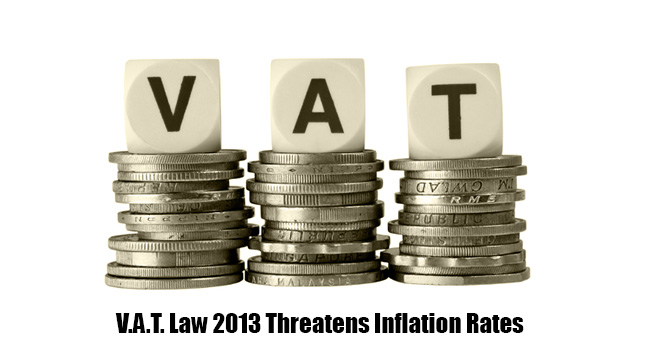VAT Law 2013 Threatens Inflation Rates

Initial introduction of the Value Added Tax (VAT) Bill 2013, which was expected to impose a 16 per cent levy on commodities, received a lot of opposition from Kenyans, including civil society groups and the Consumers Federation of Kenya (COFEK). However, despite the great opposition, it was passed into law on August 14, 2013 and took effect on September 2. As a result, the Kenyan consumer has been forced to tighten the belt due to the punitive tax rates which have seen the prices of basic commodities increase to unbelievable highs.
Persistent lobbies from consumers questioning the constitutionality of the now VAT Act and appealing to the government have fallen on a deaf ear. The government dismissed the idea of further amendments to the new Value Added Tax law firmly stating that it will be implemented as it is and no more changes will be made to it. The Consumers Federation of Kenya (COFEK) Secretary General asserted that all the contentious issues requiring amendments had been fronted to the Parliament's Committee on Finance, Trade and Planning. He however inferred that there had been foul play as he alleged that The National Treasury, however, bribed the MPs out of any amendments by paying the Sh1.1 billion vehicle grants on the day the VAT bill was up for voting before the House. Numerous amendments that had been lined up were shelved under mysterious circumstances.
Consequently, the prices of basic commodities like processed milk, newspapers and maize flour have been increased and the inflation rates are now a challenge to the country's economy.
Article 43 of the Constitution provides that every person is entitled to the highest attainable standard of health, adequate food and social security. The state has the duty to ensure that these rights are made available.
The prevailing fear is that the cost of living is expected to double in the coming months which will consequently increase the poverty levels in Kenya. It is a shame that some traders are already taking advantage of the situation and inflating the prices of products that are not listed to be taxed.
The civil society groups are already having talks on the course of action in a bid to cushion the Kenyan taxpayer.
Following the mixed interpretations of the VAT law, President Uhuru Kenyatta has directed the Treasury to publish regulations that will clarify the law; to prevent unscrupulous traders from taking advantage of Kenyans. He went ahead to explain that the VAT law is meant to simplify the tax regime, cushion the poor and increase revenues.


